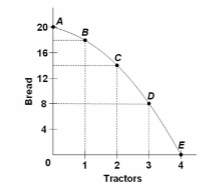Show that for a monopolist with a constant marginal cost and facing a linear demand curve, if a specific tax is imposed on the monopolist, the tax burden is shared equally between the monopolist and the consumers
What will be an ideal response?
A monopolist facing demand p = a - bQ and marginal cost c chooses a price and quantity:
p = (a + c)/2
With a tax of t, the monopolist's costs are essentially c + t, making the price:
p = (a + c)/2 + t/2
The price will rise by half of the tax.
You might also like to view...
Why is reliable data on the formation and survival of startups difficult to obtain?
Refer to the diagram. Which of the following is a positive statement?

A. A point inside the production possibilities curve is superior to a point on the curve because
the former requires less work effort.
B. Because any society should stress economic growth as its major goal, point D is superior
to point C.
C. Point B is preferable to point C because the ultimate goal of economic activity is to
maximize consumption.
D. Given its resources and technology, this society is incapable of simultaneously producing 3
units of tractors and 15 units of bread.